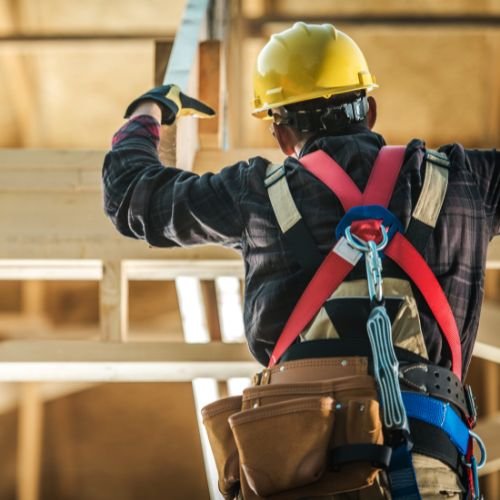Manage Your General Contractor’s License Now
Obtaining a contractor’s license in the United States is a rigorous but essential process to operate legally and successfully in the construction industry. This procedure not only protects you as a professional, but also ensures the trust and confidence of your clients.
A general contractor’s license isn’t just a piece of paper; it’s your passport to success in Florida’s construction industry. Here’s why it’s essential:
- Legal Compliance: Avoid legal problems and sanctions.
Customer Confidence: Gain the trust of your potential customers. - Access to Large Projects: Opens the door to more lucrative contracts.

Some requirements, we will expand on this in your consulting appointment
To obtain a contractor’s license in Florida, you must meet certain basic requirements, which include:

- Age: You must be at least 18 years old.
- Residency: U.S. citizen or legal resident.
- Criminal Record: No convictions for disqualifying offenses.
- Experience: Have at least four years of relevant experience or a combination of education and equivalent experience.
Complete advice when managing your Contractor’s license
A contractor’s license is an official permit issued by the state that authorizes an individual or company to perform construction work. This license ensures that the contractor complies with the standards of competence, safety and professional ethics established by state authorities.
Types of Contractors in the United States
Once your license is approved, you will be able to engage in the following activities according to your experience and training.
- General: Responsible for large and complex projects.
- Building construction: Specializing in building construction.
- Residential: Focused on residential construction and remodeling.
- Tinsmithing: They work with metals in roofs and ducts.
- Roof Repair: Specializing in roof installation and repair.
- Air Conditioning Class A and B: Installation and repair of air conditioning systems.
- Plumbing: Installation and repair of plumbing systems.
- Electrician: Installation and repair of electrical systems, wiring, sockets, etc.
- Swimming Pools and Spas: Construction and maintenance of swimming pools and spas.
- Contaminant Storage Systems: Installation and maintenance of contaminant storage systems.

Impact of Licenses on the Labor Market
- Employment Growth: According to the Bureau of Labor Statistics, construction employment is expected to grow 11% from 2020 to 2030, faster than the average for all occupations.
- Salaries: Licensed contractors in Florida earn an average annual salary of $60,000 to $90,000, depending on specialization and experience.
- Demand for Services: Demand for construction and remodeling services remains high, driven by population growth and the need for infrastructure.
Economic Benefits

- Contribution to GDP: The construction industry contributes significantly to Florida’s Gross Domestic Product (GDP).
- Employment Generation: Licensing creates more direct and indirect jobs in the industry.
Legal Proceedings and Practical Advice
Avoid Legal Problems
- Building Code Compliance: Ensure that all work complies with local and state building codes.
- Obtain Permits: Obtain all necessary permits before starting any project.
- Clear Contracts: Use detailed contracts that specify the scope of work, costs and deadlines.
- Legal Review: It is always advisable to have an attorney review contracts and other legal documents.
- Adequate Insurance: Maintain adequate insurance coverage to protect against potential litigation.

Frequently Asked Questions
A general contractor’s license is an official accreditation that allows you to legally operate in the construction industry in Florida. It is essential to comply with state regulations, gain the trust of your clients and access larger, more lucrative projects.
Requirements include having at least 4 years of experience in the construction industry, passing exams (one in business and finance, and one in your area of specialty), and providing documentation such as liability insurance and a performance bond.
You need to pass the exams: one that covers business and finance and another that focuses on your specific area of construction. These tests evaluate your technical knowledge and your ability to manage the financial aspects of your business.
The process can vary, but generally takes between 3 to 6 months from application to licensing, depending on how quickly the exams are completed and passed and the documents are processed.
You need liability insurance to cover possible damages and claims that may arise during your projects. The amount of coverage required may vary, so check state-specific requirements.
Having a license allows you to work legally, access larger projects, increase your credibility and build trust with your clients. It also protects you from legal and financial penalties.
Operating without the required license can result in significant fines, legal penalties, and the inability to get paid for your work. You may also face lawsuits and problems with regulatory authorities.
A criminal record does not necessarily disqualify you, but it can complicate the process. Each case is evaluated individually, and you may need to provide additional information or face further review.
The validity of your license outside of Florida depends on the state in which you want to work. Some states have reciprocity agreements, while others may require you to obtain an additional license.
With a general contractor’s license, you can work on a wide range of construction projects, including residential, commercial and public works. However, some specialized projects may require additional licenses.
